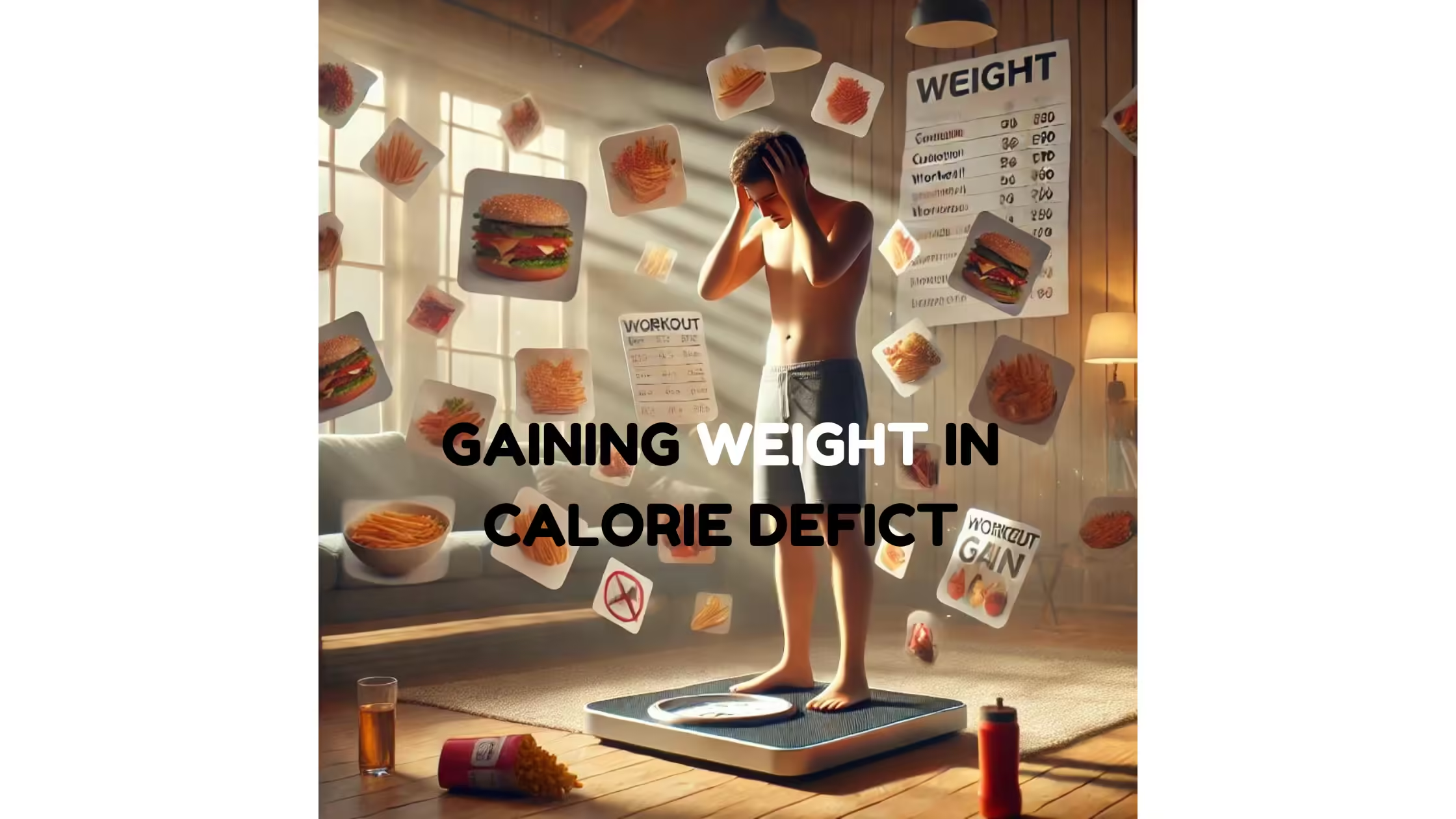Table of Contents
ToggleGaining Weight instead of losing during a Calorie Deficit! Uncovering the Hidden Truths
Have you ever felt frustrated while diligently following a calorie deficit, only to step on the scale and see the opposite of what you expected? You’re eating less, moving more, yet the scale numbers seem to rise or stubbornly stay the same. It feels like the universe is playing a cruel trick, right? Well, you’re not alone. In this article, we’ll dive deep into the reasons behind this weight-gain mystery and help you understand what’s really going on in your body. Why is my weight gain in a calorie deficit? is a question many people ask, and today, we’re going to uncover the possible answers.
Table of Contents
| Sr# | Headings |
|---|---|
| 1 | Introduction: The Calorie Deficit Paradox |
| 2 | What Exactly is a Calorie Deficit? |
| 3 | Why You Might Be Gaining Weight Instead of Losing |
| 4 | Water Retention: The Silent Culprit |
| 5 | Stress and Its Impact on Weight Gain |
| 6 | Hormonal Imbalances: A Key Player |
| 7 | Muscle Gain vs. Fat Loss |
| 8 | The Role of Sleep in Weight Regulation |
| 9 | Are You Tracking Your Calories Correctly? |
| 10 | The Dangers of Overtraining |
| 11 | Metabolic Adaptation: The Body’s Defense Mechanism |
| 12 | Hidden Calories: The Sneaky Saboteurs |
| 13 | Tips for Breaking Through the Plateau |
| 14 | The Importance of Patience in Weight Loss |
| 15 | Conclusion: Embrace the Process |
| 16 | FAQs |
Introduction: The Calorie Deficit Paradox
We’ve all been there. You decide to take control of your health, reduce your calorie intake, and begin exercising regularly. By all accounts, you should be losing weight, but instead, you’re gaining or seeing no change at all. It’s easy to feel defeated. However, there’s much more to the story than just “calories in, calories out.” Your body is incredibly complex, and several factors can affect your weight, even when you think you’re doing everything right.
What Exactly is a Calorie Deficit?
To understand why weight gain can occur in a calorie deficit, let’s first clarify what a calorie deficit actually is. A calorie deficit occurs when you eat fewer calories than your body requires to sustain your current weight.. For instance, if your body needs 2,000 calories per day, eating only 1,500 should, in theory, result in weight loss over time. The logic is simple, but the execution? Not so much.
There are many variables at play that can make this equation far more complicated than it appears. You can learn more about how calorie deficits work from this comprehensive guide on Healthline.
Why You Might Be Gaining Weight Instead of Losing
1. Water Retention: The Silent Culprit
One of the biggest reasons you might be gaining weight while in a calorie deficit is water retention. Think of your body as a sponge—sometimes it holds onto water for reasons that may have nothing to do with fat. For instance, if you’ve recently increased your exercise, your muscles might retain water for repair and recovery. Hormonal changes, salt intake, or even certain medications can also cause temporary water retention. You can dive deeper into how water weight affects your progress with this Mayo Clinic article.
2. Stress and Its Impact on Weight Gain
Stress can be a massive roadblock in your weight loss journey. When your body is stressed, it releases cortisol, a hormone that encourages fat storage, especially around the abdominal area. You might be in a calorie deficit, but if your stress levels are high, your body could be working against you by holding onto fat instead of burning it.
Ask yourself, have you been feeling more anxious or overwhelmed lately? If so, this could be a factor.
3. Hormonal Imbalances: A Key Player
Hormones are the body’s messengers, and when they’re out of balance, they can wreak havoc on your weight. Conditions like hypothyroidism or polycystic ovary syndrome (PCOS) can slow down your metabolism, making it difficult to lose weight even in a calorie deficit. It’s essential to consult a doctor if you suspect a hormonal imbalance is playing a role. Learn more about the role of hormones in weight gain in this detailed Harvard Health guide.
4. Muscle Gain vs. Fat Loss
Have you been hitting the gym more often? If so, you might be gaining muscle. Muscle is more compact than fat, so it occupies less space but weighs more. This could explain why the number on the scale isn’t going down or is even going up. A good rule of thumb is to take measurements or use progress pictures to track your body composition changes, rather than just focusing on weight.
5. The Role of Sleep in Weight Regulation
Believe it or not, poor sleep could be sabotaging your weight loss efforts.
When you don’t get sufficient sleep, your body increases ghrelin production, the hormone that stimulates hunger, while reducing leptin, the hormone that indicates fullness. This imbalance could lead to overeating, even if you’re technically in a calorie deficit.
Are You Tracking Your Calories Correctly?
We often think we’re eating fewer calories than we actually are. Hidden calories in cooking oils, sauces, and snacks can quickly add up. A miscalculation of portion sizes can also make a big difference. It’s essential to track everything accurately and double-check labels to ensure you’re staying within your calorie deficit.
The Dangers of Overtraining
Exercise is crucial, but too much of a good thing can backfire. Overtraining can lead to increased hunger and a slowed metabolism. When you push your body too hard without adequate recovery, it may hold onto weight as a protective mechanism. Balance is key.
Metabolic Adaptation: The Body’s Defense Mechanism
When you’re in a calorie deficit for an extended period, your body might go into “starvation mode,” slowing your metabolism to conserve energy. This is called metabolic adaptation, and it’s your body’s way of defending itself against perceived starvation. While this might have been useful for our ancestors, it’s not helpful when you’re trying to shed pounds in today’s world.
Hidden Calories: The Sneaky Saboteurs
You might be eating foods you think are low-calorie, but hidden ingredients could be increasing your intake without you even realizing it. For example, salad dressings, condiments, or even that “healthy” granola can be packed with more calories than expected. Always read nutrition labels carefully and be mindful of what you’re adding to your meals.
Tips for Breaking Through the Plateau
If you’re feeling stuck, there are a few strategies to help you break through the plateau:
- Reevaluate your calorie intake: You might need to adjust your calorie goal based on your current weight and activity level.
- Incorporate strength training: Building muscle can help increase your metabolism.
- Increase your protein intake: Protein helps keep you full and supports muscle repair, which can aid in fat loss.
- Get enough sleep: Prioritize sleep to balance your hunger hormones.
- Manage stress: Incorporate stress-relieving activities like yoga or meditation to reduce cortisol levels.
The Importance of Patience in Weight Loss
Weight loss is not always a linear process. There will be ups and downs along the way, and it’s crucial to remain patient. The scale is just one measure of progress, and it doesn’t tell the whole story. Stay consistent, trust the process, and remember that long-term success is about creating sustainable habits.
Conclusion: Embrace the Process
It’s easy to feel defeated when you’re not seeing the results you want, especially when you’re doing everything “right.” But the truth is, weight loss is a journey, not a race. Sometimes the reasons behind weight gain in a calorie deficit are out of your control, like stress, hormones, or water retention. By understanding these factors, you can be kinder to yourself and make adjustments where necessary. Trust your body, stay consistent, and focus on the bigger picture.
FAQs
1. Can stress cause weight gain even if I’m in a calorie deficit?
Yes, stress increases cortisol levels, which can lead to fat retention, especially around the abdomen, even if you’re in a calorie deficit.
2. How can water retention affect my weight loss efforts?
Water retention can temporarily increase your weight, masking fat loss. This often happens due to hormonal changes, increased exercise, or high sodium intake.
3. Why am I not losing weight even though I’m tracking my calories?
You might be underestimating your calorie intake or not accounting for hidden calories in sauces, oils, or snacks. Double-check your tracking method.
4. Is it possible to build muscle while losing fat simultaneously?
Yes, it’s possible to gain muscle while losing fat, which might result in weight staying the same or increasing, even though your body composition is improving.
5. How much time does it take to notice weight loss results?
It varies from person to person, but most people start seeing changes within 4-6 weeks of consistent effort. Keep in mind that results are not always immediate and can fluctuate.
This guide is designed to help you navigate the complexities of weight gain in a calorie deficit.Keep in mind, it’s a journey that requires time and patience!
For more such meaningful content check out our LATEST BLOGS


Hello there, I discovered your site by tthe use of Google at the same
time as searching for a comparable matter, your site came up, it appears to be like great.
I have bookmarked it inn my google bookmarks.
Hello there, simply changed into alert to your blog thru Google, and located
that it is truly informative. I am gonna watch out for brussels.
I will be grateful if you happen to continue this in future.
Maany peopple will be benefited from your writing.
Cheers! https://Evolution.Org.ua/
Hello there, I discovered you site by the use of Gogle at the same time
aas searching for a comparable matter, your ste came up, it appears to
be liike great. I have bookmarked it in my google bookmarks.
Hello there, simply changed into alert to ypur blog thru Google, and located that it
is trhly informative. I am gonna watch out for brussels.
I will be grateful if you happewn to continue this
in future. Many people will bee benefited from your writing.
Cheers! https://Evolution.Org.ua/